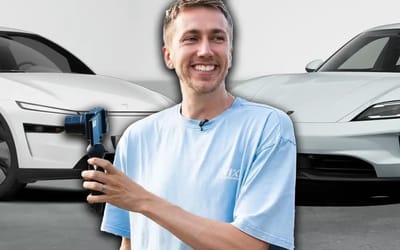Elon Musk claims Neuralink patients will soon be able to outperform pro gamers
- Neuralink has implanted a brain chip into its second human patient
- Elon Musk has talked about his lofty goals for the technology
- It goes beyond helping patients live independently
Published on Aug 06, 2024 at 7:14 PM (UTC+4)
by Amelia Jean Hershman-Jones
Last updated on Oct 02, 2024 at 1:25 PM (UTC+4)
Edited by
Tom Wood
After Neuralink implanted a brain chip into their second human patient, Elon Musk has talked about his lofty goals for the technology.
The founder expressed that the procedure went ‘extremely well’.
However, his rather surprising hope was regarding patients’ gaming abilities.
DISCOVER SBX CARS: The global premium car auction platform powered by Supercar Blon
The second procedure

Brain-computer interface startup Neuralink implanted its first quarter-sized brain chip into its first human patient, 30-year-old Noland Arbaugh, in January.
He was left paralyzed after a spinal cord injury in 2016 and described his initial freedom.
However, a month after the procedure, he reportedly lost some of his capabilities after some of the Neuralink implant threads came loose in his brain.
Following software tweaks and with only 10 to 15 percent of his N1 electrodes working, Arbaugh has been able to beat his former world record for speed and accuracy in controlling a cursor with a BCI, per Elon Musk.



The second implant procedure received far less fanfare.
“We’re hoping to do 10 by the end of this year,” he told the host.
“It’s obviously going to get better with each one.”
Neuralink’s anonymous second patient currently has around 400 functioning electrodes.
“I don’t want to jinx it, but it seems to have gone extremely well with the second implant. There’s a lot of signals, a lot of electrodes,” Musk. said.
How the implant works


In a procedure that has surprised many, Neuralink’s primary products are its N1 brain-computer interface (BCI) and a robot surgeon designed to insert it.
Per their website, it’s a ‘generalized brain interface to restore autonomy to those with unmet medical needs today and unlock human potential tomorrow’.
It offers independence to those with neurological damage, enabling them to control computer cursors with their thoughts and connect to the digital world without the need for movement.
Each chip contains over 1,000 electrodes across 64 threads, these transmit neural signals post-procedure from the brain’s motor cortex.
Elon Musk and his team hoping to complete another eight by the end of 2024, per Lex Fridman’s 2 August podcast.
The team expects N1 to showcase ‘gigantic’ improvements over the years, according to Musk.
He noted that, over time, the number of electrodes will increase and signal processing will improve.
The goal of Elon Musk

While the 2017-launched company was established to aid those living with paralysis by ‘solving fundamental neuron damage in the spinal cord, neck or in the brain’, there are some pretty cool side-effects.
In addition to improving patient communication, the Neuralink founder said his startup might as well also alter it to exceed that of the ordinary human.
“While we’re in there, why not? Let’s give people superpowers,” Musk said.
“We feel pretty confident that within the next year or two, someone with a Neuralink implant will be able to outperform a pro gamer because the reaction time will be faster,” he told Fridman.
These abilities were first showcased in impressive footage showing Arbaugh controlling Mario Kart using his mind
The company’s ultimate long-term goal is to ‘improve the A.I.-human symbiosis’ in a world dominated by AI, Elon Musk told Fridman.

London-based Amelia cut her journalistic teeth covering all things lifestyle, wellness, and luxury in the UK capital. Fast-forward a decade and the senior content writer and editor has put pen to paper for glossy magazines, busy newsrooms, and coveted brands. When her OOO is on from writing about cars and heading up on-site SEO you can find her spending quality time with her young family, in the gym, or exploring the city she loves.




